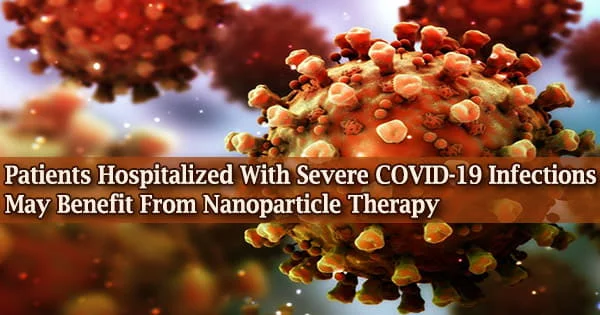Researchers from Johns Hopkins Medicine report that in a study of 24 critically ill people hospitalized with COVID-19, an investigational dendrimer nanoparticle therapy called OP-101 significantly decreased the risk of death and the need for a ventilator.
Results of the small clinical trial, funded by the drug’s manufacturer, Ashvattha Therapeutics, a startup company based at Johns Hopkins, showed that patients who took the medication experienced a more than fourfold higher rate of decline in circulating biomarkers of inflammation and brain injury than those who received a placebo.
A report on the study was published July 20, 2022, in Science Translational Medicine.
“OP-101 could be a potent therapy for decreasing hyperinflammation and promoting repair in people with severe COVID, showing significant clinical benefit without the associated side effects typically seen with some other treatments,” says Sujatha Kannan, M.B.B.S., professor of anesthesiology and critical care medicine and pediatrics at the Johns Hopkins University School of Medicine.
In order to create OP-101, Kannan and her husband, Kannan Rangaramanujam, Ph.D., professor of ophthalmology at the Wilmer Eye Institute, Johns Hopkins Medicine, attached a potent anti-inflammatory and antioxidant drug called n-acetyl cysteine (NAC) to a nanoparticle 100,000 times smaller than the thickness of a sheet of paper.
Each nanoparticle is connected to a number of medication molecules and is capable of delivering the drug particularly to inflammatory cells known as macrophages. Only the macrophages implicated in inflammation at the site of injury receive the medication from the dendrimer nanoparticle. NAC is currently utilized to treat acetaminophen overdose and thin mucus discharges in the airways in a different form.
The two scientists established the California-based biotechnology company Ashvattha Therapeutics Inc. to develop the drug and finance clinical studies. They are co-inventors on patents pertaining to the discovery of the drug. Through Johns Hopkins Technology Ventures, the company obtains technology licenses.
OP-101 could be a potent therapy for decreasing hyperinflammation and promoting repair in people with severe COVID, showing significant clinical benefit without the associated side effects typically seen with some other treatments.
Professor Sujatha Kannan
The researchers advise using OP-101 to treat COVID-19 only in a clinical trial or, for other medical purposes, under the supervision of a doctor. They also warn that larger clinical trials of OP-101 must be finished.
24 patients with severe COVID-19, predominantly male, aged 43 to 86 (five Black, 15 Hispanic, and four non-Hispanic White), were recruited for the study from hospitals in five medical systems spread across five states in the U.S., including The Johns Hopkins Hospital.
Patients with severe COVID-19 symptoms who were receiving oxygen through a high-flow nasal cannula or mechanical ventilation were eligible to participate in the trial. The intensive care unit was where the majority of the study’s patients were located.
Within 24 hours after enrolment, six patients got a single intravenous 2 mg/kg dosage of OP-101, six patients received a 4 mg/kg dose, five patients received an 8 mg/kg dose, and seven patients received a saline placebo.
All 24 patients also received the usual COVID-19 treatment, which included the antiviral medication remdesivir and corticosteroids to reduce inflammation. Before the study’s conclusion, the researchers were unaware of which patients got OP-101 or a placebo.
At the end of the trial, the researchers discovered that OP-101, at a dosage of either 4 mg/kg or 8 mg/kg, was fourfold to tenfold better at reducing neurologic injury biomarkers like neurofilament light and glial fibrillary acidic protein. It was also six times better at reducing the inflammation marker C-reactive protein.
At 30 and 60 days after therapy, patients who received the placebo had a 71% chance of dying or needing a ventilator, but patients who received OP-101 had an 18% chance.
Three of the seven patients who received the placebo at 60 days and 14 of the 17 patients who received any of the three doses of OP-101 had survived. In this critically ill population, OP-101 was well tolerated and not linked with any side effects.
“It is possible that OP-101 may also be useful in treating the neurologic, cardiac, and respiratory symptoms associated with long COVID since a proportion of patients with long COVID have persistent inflammation,” says Rangaramanujam Kannan.
The researchers are planning larger clinical trials of OP-101.
Other contributors to the research include Aaron Gusdon, HuiMahn Choi, and Louise McCullough from the University of Texas; Nauder Faraday, Derek Ng, and Kannan Rangaramanujam from Johns Hopkins; John Aita from Avera McKennan Hospital; Sunil Kumar from Broward Health Medical Center; Ishan Mehta from Emory University; Jeffery L. Cleland from Ashvattha Therapeutics Inc. and Keith Robinson from Syneos Health.
The study was funded by Ashvattha Therapeutics Inc.
Under licensing agreements between Ashvattha Therapeutics, LLC and The Johns Hopkins University, Sujatha Kannan, Kannan Rangaramanujam, and the university are entitled to royalty distributions and share ownership related to technology discussed in this press release. Kannan and Rangaramanujam are founders of and hold equity in Ashvattha Therapeutics, LLC.
Johns Hopkins University has reviewed and approved this agreement in compliance with its conflict of interest procedures. Ashvattha Therapeutics, LLC also provided material assistance for the study that was the subject of this press release. Derek Ng is employed at Ashvattha Therapeutics, LLC as a consultant.





